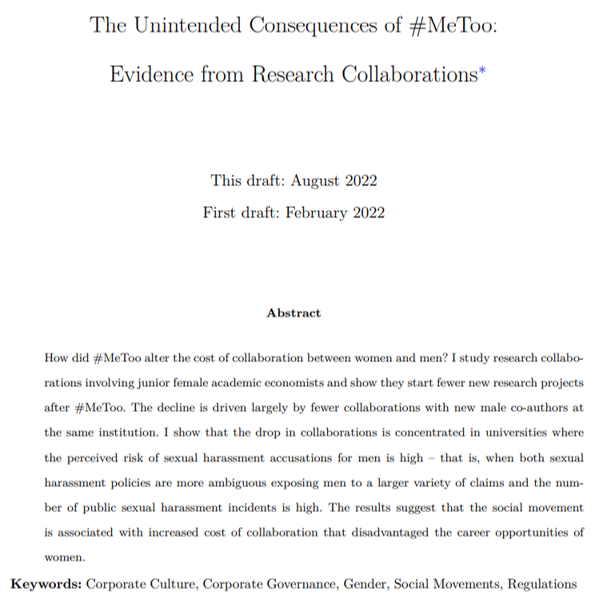NEW WP 🚨: How did collaborations between men & women change after #MeToo?
Overall, I show women’s productivity falls post #MeToo, largely due to fewer collaborations with men.
👉ssrn.com/abstract=41059…
A 🧵 (n/8)
Comments are welcome!
Overall, I show women’s productivity falls post #MeToo, largely due to fewer collaborations with men.
👉ssrn.com/abstract=41059…
A 🧵 (n/8)
Comments are welcome!

2/8
I provide evidence from research collaborations in economics:
Annual output of (the same) junior female academic fell post #MeToo by 0.7/1.7 projects. A drop in new projects with all male co-authors explains 60% of output decline—largely new males at the same university.
I provide evidence from research collaborations in economics:
Annual output of (the same) junior female academic fell post #MeToo by 0.7/1.7 projects. A drop in new projects with all male co-authors explains 60% of output decline—largely new males at the same university.
3/8
Women don’t make up for the loss in projects with men by collaborating more with other women or solo work.
Junior men do make up for lost collaborations with women by collaborating more with men. So, men don’t have a loss in projects overall.
Women don’t make up for the loss in projects with men by collaborating more with other women or solo work.
Junior men do make up for lost collaborations with women by collaborating more with men. So, men don’t have a loss in projects overall.
4/8
Do women or men drive the collaboration decrease? My interpretation: men manage what they perceive as higher sexual harassment accusation risk post #MeToo.
But both parties must agree to collaborate, so it’s hard to find a smoking gun.
Here is why I think it’s men:
Do women or men drive the collaboration decrease? My interpretation: men manage what they perceive as higher sexual harassment accusation risk post #MeToo.
But both parties must agree to collaborate, so it’s hard to find a smoking gun.
Here is why I think it’s men:
5/8
When sexual harassment policies are ambiguous & the number of public sexual harassment incidents is high - the decline in collaborations between men & women is larger.
So, it seems that salience of sexual harassment reporting & unclear policy together drive the decline.
When sexual harassment policies are ambiguous & the number of public sexual harassment incidents is high - the decline in collaborations between men & women is larger.
So, it seems that salience of sexual harassment reporting & unclear policy together drive the decline.
6/8
Story 1: Men think “#MeToo means if I accidentally say the wrong thing, I’ll be cancelled/fired. I’d better stay away from women.” Clear policies show that “saying the wrong thing” doesn’t get you cancelled/fired, so clear policies reduce men’s (perceived) risk of #MeToo.
Story 1: Men think “#MeToo means if I accidentally say the wrong thing, I’ll be cancelled/fired. I’d better stay away from women.” Clear policies show that “saying the wrong thing” doesn’t get you cancelled/fired, so clear policies reduce men’s (perceived) risk of #MeToo.
7/8
Story 2: Women think “#MeToo means I don’t have to work with the predator men anymore, so I’ll avoid them.” If that’s the story, we should see the decrease in collaborations regardless of whether policies are clear or not.
Story 2: Women think “#MeToo means I don’t have to work with the predator men anymore, so I’ll avoid them.” If that’s the story, we should see the decrease in collaborations regardless of whether policies are clear or not.
8/8
Implication 💡: #MeToo was important to raise awareness. But the intent was not to impose costs on women’s careers. #MeToo plus clear policies could create awareness for sexual harassment without hurting women’s productivity.
Implication 💡: #MeToo was important to raise awareness. But the intent was not to impose costs on women’s careers. #MeToo plus clear policies could create awareness for sexual harassment without hurting women’s productivity.
• • •
Missing some Tweet in this thread? You can try to
force a refresh




